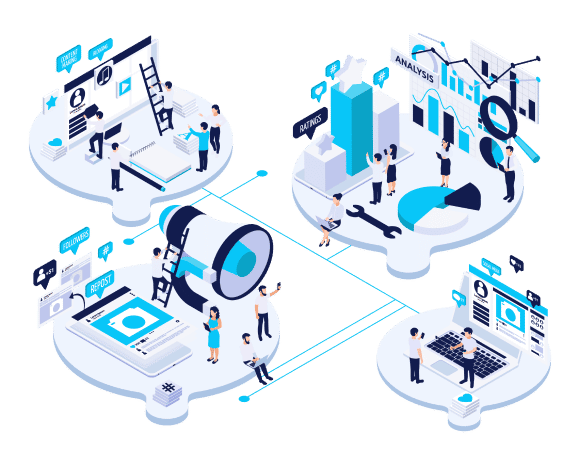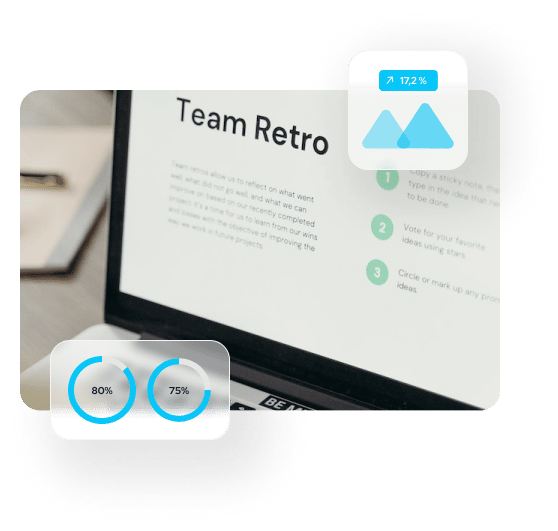Helping With ERP Implementation
By taking off 70% of the workload from clients’ shoulders through a streamlined ERP implementation process, structured testing approach, and building reusable training video libraries.

Problems Companies Face
When They Need Help With ERP Implementation?
Don’t have the internal capacity to manage projects? Executives too busy to dedicate time to the ERP implementation? No experience with restructuring data or processes? ElevatIQ’s ERP implementation expertise is designed to help companies when they struggle with these challenges.
Executives Don’t Have Bandwidth for the ERP Implementation
Getting nightmares of failing the implementation because of selecting the wrong ERP system? Afraid of budget overruns because of the over-commitment of the vendors? Not sure how to create an implementation plan for the newly selected ERP? Companies seek help from ElevatIQ when they might be afraid of failing ERP implementation.
Limited Experience in Managing Large ERP Programs
Don’t have experience in managing large ERP programs? Don’t know how to build an implementation plan that is not too risky? Companies seek help from ElevatIQ when they don’t have the capabilities to identify critical success factors for ERP selection.
No Experience Restructuring Master Data and Processes as per Vendors’ Needs
Not able to follow the instructions of technical vendors on how to restructure your data that will provide the needed operational efficiency? Not sure if you should restructure your processes or implement them as is? Companies seek help from ElevatIQ when they need help in restructuring master data and processes.
Not Enough Experience in Designing Test Cases That Might Cause Go-live Issues
Not sure if the ERP would produce business results? Worried if your business users will like the new ERP system? Uncertain whether the ERP system will work for your business processes or not? Companies seek help from ElevatIQ when they are worried about whether the ERP will produce business results or not.
Not Enough Experience in Making Critical Architectural and Process Decisions
Not sure whether the processes must reside inside the ERP or in an ancillary system? Not sure which system, such as CRM vs. ERP, is the right candidate for a specific process? Companies seek help from ElevatIQ when they are not able to make critical architectural and process decisions.
Want to learn more about why independent ERP consultants have a higher success rate with ERP Implementation?
Our Case Studies for
ERP Implementation

Digital Transformation Change and Project Management
Download the digital transformation change and project management case study and learn how Big Country Raw managed the change and transformation despite their limited budget for ERP implementation and eCommerce integration.

Mergers and Acquisitions ERP Integration Failure Rescue
Download the mergers and acquisitions ERP integration failure Case Study and learn how Pride Sports struggled with Supply Chain and inventory allocation issues, as well as operational disruptions due to poorly planned M&A integration and ERP transformation project.

ERP Optimization and Integration Architecture Development
Download the ERP optimization and integration architecture development case study and learn how Work Sharp fixed their broken ERP implementation that caused customer service issues and improved Supply Chain planning.
Our Methodology
for ERP Implementation
The process starts with workshops and training users on the selected ERP system. It will also configure the cleansed data for the selected customers, vendors, and products to test and train on the to-be processes. The testing phase continues until the core users get the hang of the new processes and are satisfied that they will work for their function. The testing phase is then followed by the master data upload, go-live preparation, change management planning, and post-deployment KPI measurement.

1 Requirements Validation and Initial Configuration
This phase starts with validating requirements from the selection phase. And if additional requirements need to be vetted further before the configuration phase begins.
3 To-be Process Optimization
The testing phase continues until the core users get the hang of the new processes and are satisfied that they will work for their function. If the to-be processes need to be tweaked further, the changes are made to the data and processes. As well as incorporating them as part of the change management plan.
5User Security Model Creation and Testing
This phase designs the user security model as per organizational hierarchy. And test them for each persona to avoid any financial control leakage because of poor security setup and governance workflows. This phase also maps out SOX compliance processes as required by the governing bodies.
7Cutover Planning and End User Training
This phase facilitates workshop-style end-user training and audits end users’ understandings of the to-be process through several auditable processes such as quizzes and video replays. As well as proposing strategies to meet individuals’ training needs. This phase also reviews the go-live plan to ensure the team and site are ready for the go-live.
2User Training and To-be Process Validation
This phase starts with training users on the selected ERP system. It will also configure the cleansed data for the selected customers, vendors, and products to test and train on the to-be processes.
4Data Re-engineering and Master Data Governance
This phase further validates that the re-engineered data is consistent with the data model of the selected ERP product. And if any changes need to be made to align with the optimum workflow of each user.
6Master and Transactional Data Upload and Historical Data Planning
This phase prepares and tests the master data with the complete datasets, such as MRP runs, and then prepares for the transactional data upload. This phase also prepares the historical data upload depending on how much historical data need to be uploaded.
8Go-live Support and Post go-live Optimization
This phase monitors the to-be process compliance and accommodates any necessary process or data changes. This phase also monitors the revised KPIs and ensures that the new processes and data changes are able to hit the revised KPIs. If not, further changes are explored to hit the KPIs.
Ready to learn how we can help With ERP Implementation?
Our Other
ERP Services
ElevatIQ ERP services include ERP strategy and selection, implementation, project recovery, and optimization. Basically, ElevatIQ is one stop shop for all your ERP needs.
ERP Strategy and Selection
Our ERP Strategy and Selection services start with an assessment of the current pain points with the current systems and existing ERP. The assessment results in building high-level as-is and to-be processes and change management and process reengineering recommendations. This phase is then followed by RFP development, vendor demonstrations, and finally, vendor negotiations.
ERP Project Recovery
It’s very common that the ERP implementation would have substantial issues with implementation due to the overengineering of components or processes. The service helps clarify the architecture, remove overengineered processes and data, remove any unnecessary customizations, and rebuild the architecture designed to scale.
ERP Optimization
This service helps in optimizing the performance of an ERP. The poorly implemented ERP may have performance issues such as customers taking more than 15 mins to retrieve a record, the planning not being aligned with operations, or BOMs not being consistent with the needs of the production floor.


